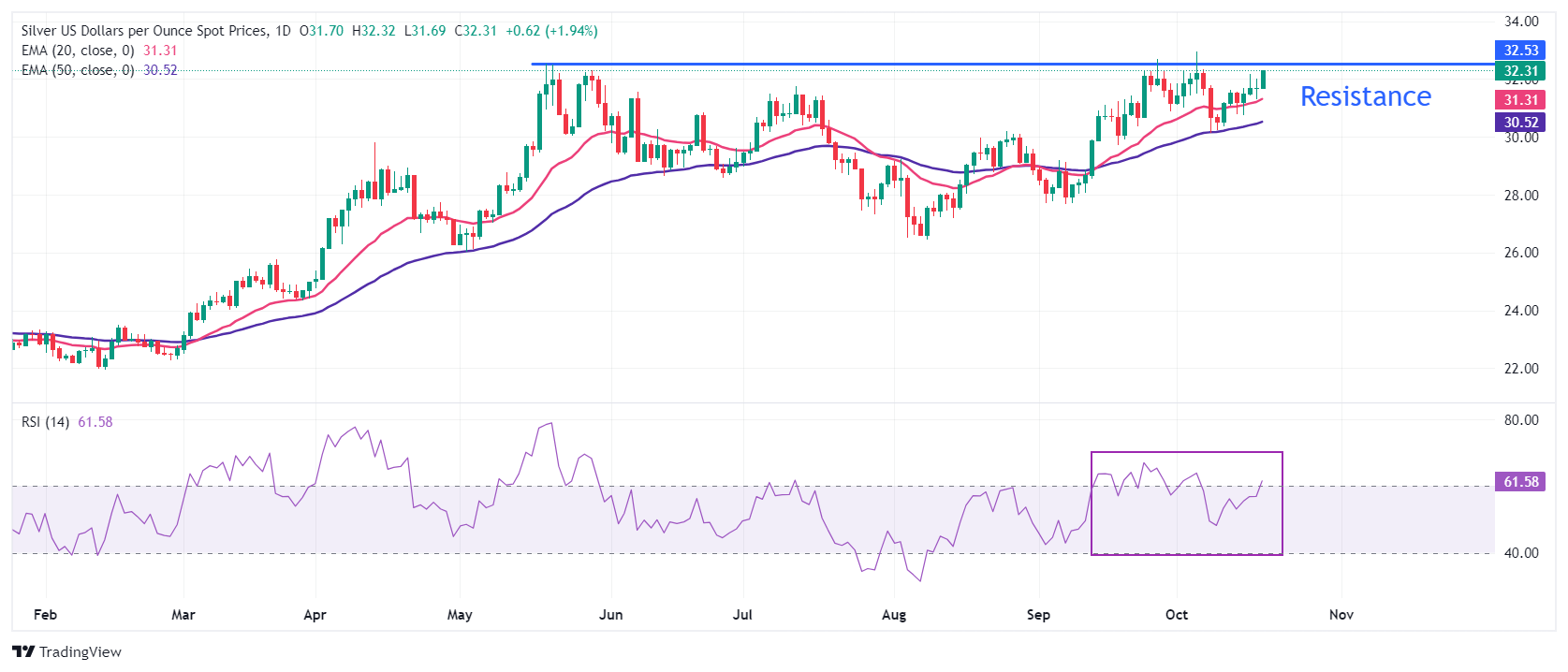Silver Price Forecast: XAG/USD breaks above $32 as few catalysts improve its safe-haven demand
- Silver price jumps above $32.00 on multiple tailwinds.
- Israel vowed to escalate attacks on Gaza after Sinwar’s killing.
- Investors expect the Fed to go slow with interest rate cuts.
Silver price (XAG/USD) climbs above the key resistance of $32.00 in Friday’s North American session. The white metal strengthens as a few catalysts have improved its demand as a safe-haven. Growing uncertainty over US presidential elections and escalating tensions in the Middle East region have forced investors to remain risk-averse.
There is a neck-to-neck competition between Democratic Kamala Harris and former US President Donald Trump in national polls. According to FiveThirtyEight’s daily election poll tracker, Kamala Harris is leading polls and has a 2.4-percentage-point lead over Republican Trump.
Meanwhile, tensions between Iran and Israel have grown further as Israeli Prime Minister Benjamin Netanyahu vowed to continue the massacre in Gaza and Lebanon after the killing of Hamas leader Yahya Sinwar on Wednesday, which has dashed hopes of a ceasefire.
The white metal continues to find bids despite market expectations for the Federal Reserve (Fed) to cut interest rates further by 50 basis points (bps) in November have gone out of the picture. Traders expect the Fed to follow a moderate rate-cut path. This has kept the US Dollar (USD) firm against its major peers. The US Dollar Index (DXY), which tracks the Greenback’s value against six major peers, falls slightly from its 10-week high of 103.90, but its outlook remains upbeat.
Silver technical analysis
Silver price comes closer to revisiting the decade-high of $33.00. Upward-sloping 20- and 50- Exponential Moving Averages (EMAs) near $31.30 and $30.50, respectively, suggest a strong uptrend.
The 14-day Relative Strength Index (RSI) approaches 60.00. A decisive break above the same would activate a bullish momentum.
Silver daily chart
Silver FAQs
Silver is a precious metal highly traded among investors. It has been historically used as a store of value and a medium of exchange. Although less popular than Gold, traders may turn to Silver to diversify their investment portfolio, for its intrinsic value or as a potential hedge during high-inflation periods. Investors can buy physical Silver, in coins or in bars, or trade it through vehicles such as Exchange Traded Funds, which track its price on international markets.
Silver prices can move due to a wide range of factors. Geopolitical instability or fears of a deep recession can make Silver price escalate due to its safe-haven status, although to a lesser extent than Gold's. As a yieldless asset, Silver tends to rise with lower interest rates. Its moves also depend on how the US Dollar (USD) behaves as the asset is priced in dollars (XAG/USD). A strong Dollar tends to keep the price of Silver at bay, whereas a weaker Dollar is likely to propel prices up. Other factors such as investment demand, mining supply – Silver is much more abundant than Gold – and recycling rates can also affect prices.
Silver is widely used in industry, particularly in sectors such as electronics or solar energy, as it has one of the highest electric conductivity of all metals – more than Copper and Gold. A surge in demand can increase prices, while a decline tends to lower them. Dynamics in the US, Chinese and Indian economies can also contribute to price swings: for the US and particularly China, their big industrial sectors use Silver in various processes; in India, consumers’ demand for the precious metal for jewellery also plays a key role in setting prices.
Silver prices tend to follow Gold's moves. When Gold prices rise, Silver typically follows suit, as their status as safe-haven assets is similar. The Gold/Silver ratio, which shows the number of ounces of Silver needed to equal the value of one ounce of Gold, may help to determine the relative valuation between both metals. Some investors may consider a high ratio as an indicator that Silver is undervalued, or Gold is overvalued. On the contrary, a low ratio might suggest that Gold is undervalued relative to Silver.

